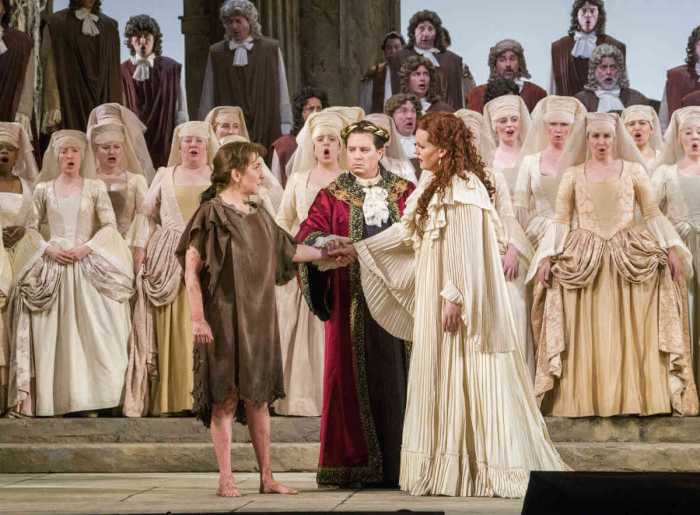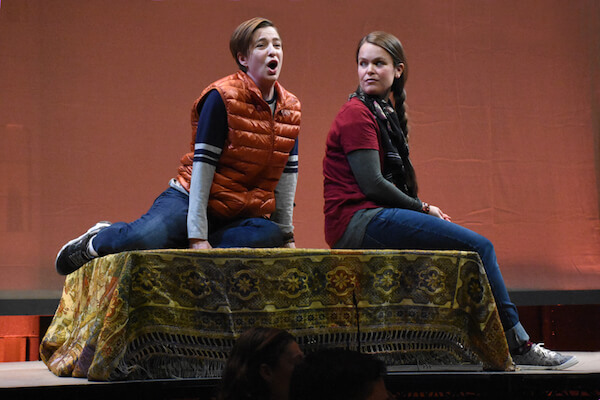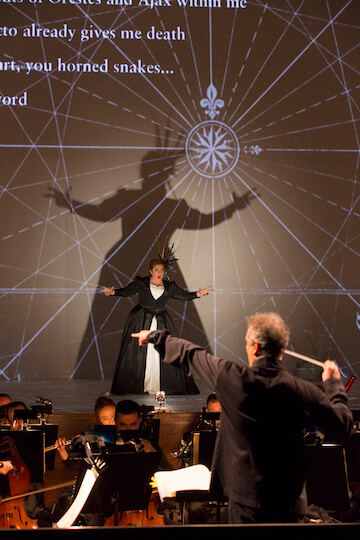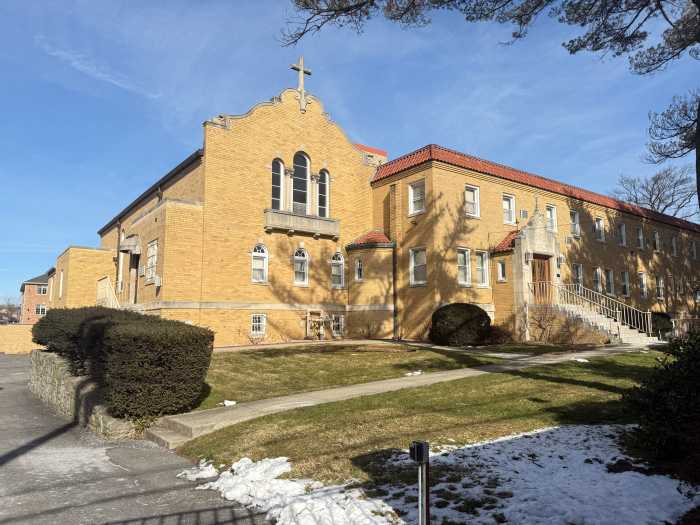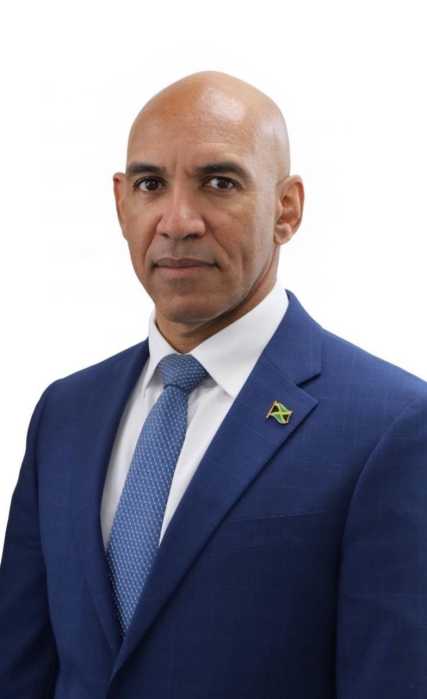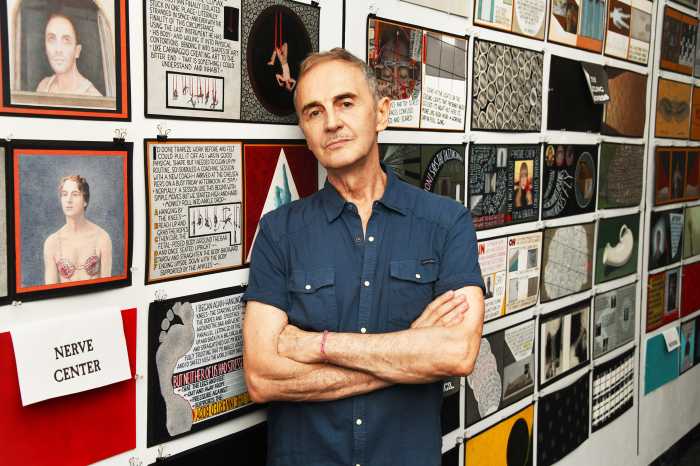BY DAVID SHENGOLD | The Boston Symphony, on October 21, gave a Carnegie Hall performance of Richard Strauss’ mighty “Elektra” that can surely be termed “historic” — as much for the remarkably skilled and sonorous playing under Andris Nelsons as for Christine Goerke’s extraordinarily committed, accomplished singing and acting in the title role. This brilliant score works very well in concert presentation, and Nelsons, though he occasionally overwhelmed the singers with the huge onstage orchestra, just as frequently honored what the composer termed “fairy-tale music,” the delicate passages. The Boston strings proved dynamically pliable, thundering forth with fortissimo chords –– and then cushioning the singers’ softest work with elegance.
After triumphs elsewhere, Goerke’s wild success didn’t surprise, but was nonetheless thrilling to behold and hear. Considerably slimmed down, the soprano sported a shoulderless, Bette Davis-worthy red gown with aplomb. She crept onto the stage in character and never let up. She has deepened her mastery of the text with repetition, and elected — wisely — to give a generously extroverted and physically dynamic performance, roaming all over. Goerke’s voice retains freshness and pliability from her years singing Handel and Gluck.
The refulgent, genuine dramatic soprano sounds she made in her lower and middle register are unparalleled in my live experience of this part, which sometimes gets awarded to singers known principally for high Bs and Cs. Goerke has these notes securely, but on this occasion only some leapt forward with room-filling volume. Similarly, she projected a huge range of dynamics without offering a true pianissimo. But these are both insignificant limitations given such vocal magnificence and coloristic variety. It was great to see this New York-born singer — her dues more than paid –– enjoy this frenzied triumph, and to contemplate the Brünnhildes to follow.
Elektra, Tosca, and Lulu rock out
Jane Henschel remains an effective Klytaemnestra, with a sopranoish top, and Gerhard Siegel made a first-rate Aegisthus. James Rutherford (Orest) was solid but inexpressive and unspecific. Gun-Brit Barkmin –– whose ‘20s get-up suggested Little Edie Beale enacting “Pandora’s Box” –– enunciated Chrysothemis’ text meaningfully, occasionally showing some upper register freedom, but it’s largely a metallic, unlovely timbre.
Not an “Elektra” soon forgotten.
Teatro Grattacielo’s verismo concerts always reflect admirable hard work and determination. I’m always grateful to hear these pieces that once held the stage. In the case of Umberto Giordano’s 1903 melodrama “Siberia,” heard October 24 in its 1927 revision at the Gerald Lynch Theater, the piece reflected the topicality of Russian suffering and Imperial cruelty in Western popular art in the Belle Époque.
“Siberia” proved of limited musical interest, with none of the memorable melodic drive of “Andrea Chénier.” Act II draws repeatedly on “The Song of the Volga Boatmen”: pure kitsch, though the I Cantori New York Chorus served it nicely.
Occasionally Giordano conjures diverting orchestral effects, and moments in the tenor’s part came to life; Raul Melo, some sharping under pressure aside, earned his check as Vassili, beloved of Stephana –– yet another operatic courtesan redeemed by true love but killed off by the patriarchy anyway. Marie Masters offered powerful top notes but wasn’t especially distinguished otherwise, vocally or interpretively. Oddly –– in a genre so wrapped up in iconic female parts –– Grattacielo concerts, unless an Aprile Millo or Tiffany Abban is on hand, often make one think of Scarpia’s observation: “The diva is still missing.”
The most developed character –– the semi-comic, semi-villainous Gleby, for whom Giordano bothered to craft a vocal personality –– got the most verbally nuanced and plushly vocalized performance, from baritone Daniel Ihn-kyu Lee. Excellent cameos came from Jessica Grigg (Nikona) and Megan Monaghan as a convict’s young daughter — a more credible and touching scene than most of the action.
Israel Gursky led more than serviceably, shaping the scenes as possible; occasionally string tone and brass flubs betrayed limited rehearsal. The audience responded warmly, and rightly so.
I didn’t agree with the fervent shouts of “Brava” for Angela Gheorghiu’s small-scaled, efficient, and resolutely unmoving first Met Tosca October 29. The Romanian diva remains a canny manipulator of a still attractive, but increasingly insubstantial lyric soprano, best at the top. Sporting new costumes –– of course — she postured at divahood to beat the band rather than inhabiting an individual character. Yet all too often Paolo Carignani’s band beat her: in concerted passages she had to yell top notes or parlandos. Expertly calculated, her phrasing proved uninvolving emotionally. But what mastery she retains merits respect.
Željko LuÄić, somewhat overexposed hereabouts these days, by contrast gave an individually conceived and spontaneous-seeming spin on Scarpia. Within his –– also not immense –– vocal means, LuÄić drew a crafty, self-entertaining creep worthy of Philip Seymour Hoffman. Roberto Aronica completed the opera’s trio with competent provincial singing, now marked by a tonal buzz. Act Three, alas, showed the limits of his dynamic control and phrasing imagination. Richard Bernstein remains a first-class Angelotti.
It was LuÄić’s night.
November 5 was emphatically Marlis Petersen’s night, as a fantastically energetic and remarkably sonorous protagonist of the Met’s new “Lulu.” In a stronger-willed characterization than some Lulus offer, no action seemed forced or unmotivated, plus Petersen sang 99 percent of Berg’s score with complete ease. A few super-high notes are merely sketched, but Petersen shirked nothing –– a very heartening accomplishment.
William Kentridge’ staging was predictably fascinating and well-researched in terms of period visual style. Unlike Bart Sher’s wearisome pretentions, Kentridge’s approach showed insight into the piece and the relevant cultural history. Yet it’s far too cluttered and busy. A tremendous improvement would be removing the two (skilled) mime/ dancers who cavorted and postured Expressionistically –– and insufferably –– throughout the show, drawing focus off the principals. Typical of today’s Met, alas, this approach treats every orchestral interlude — and in “Lulu” that means the most beautiful music, bar none –– as something needing stage action. Editing would improve matters, but it’s still a worthwhile experience.
Johan Reuter made a highly convincing Dr. Schoen, never ranting; for once the erotic bond between Lulu and Schoen seemed genuine. Elizabeth DeShong (Schoolboy) sounded just wonderful. Alwa’s near-impossible music did debuting Heldentenor Daniel Brenna few favors. Berg is hard on tenors: Paul Groves (Painter) commanded more attractive tone but inevitably screamed on top. Alan Oke — amusing as the Manservant — scratched out his other roles. As the lesbian Countess Geschwitz, the opera’s most sympathetic role, Susan Graham proved a good sport and –– despite some wear and tear on both range ends — in good form. At 78, Franz Grundheber’s droll, solidly sung Schigolch deserved commendation.
Lothar Koenigs brought high competence, rather than a strong profile, to Berg’s ravishing challenges. November 21’s matinee gets shown worldwide via HD.
Excellent tenor Piotr Beczala offered a local debut recital at Carnegie/ Zankel on October 30 that suffered from his reliance on a music stand. He simply seemed not to know Schumann’s “Dichterliebe” well enough to present it to sophisticated New York listeners — though, past some stiffness and slight flatting in slower songs, he vocalized attractively. The more ruggedly challenging songs evoked no fears about range or vocal scope.
But his encore of Schubert’s “Mein!,” from the heart and memory, showed what had gone lacking in the earlier cycle. Pianist Martin Katz showed greater mastery of the style and score, but indulged in banging now and again. After intermission, Beczala warmed up more and more, showing greater tonal warmth and dynamic span, presenting Slavic songs in which he was more specifically communicative. Karlowicz’s melancholy output furnished several affecting moments, and Dvorák’s “Gypsy Songs” some real bravura. The four Rachmaninov chestnuts –– straight from the playbook of Beczala’s idol Nicolai Gedda –– were excitingly done by both artists. One can catch Beczala’s wonderful voice in the Met’s “Rigoletto” through December 12.
David Shengold (shengold@yahoo.com) writes about opera for many venues.



